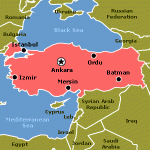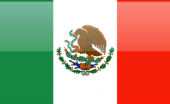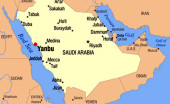Re Ian Bremmer 'Could third-party candidates upend the 2024 US election?' 3 April The current political movement in the USA…
Turkey
Written by Diana Thebaud Nicholson // November 5, 2011 // Europe & EU, Middle East & Arab World // 1 Comment
TURKEY: A Rising Influence Among Arab Nations
(IPS) Assurances to women by the winners of the Tunisian elections that they will be free not to wear the Muslim veil has come as music to the ears of Turkish secularists. It was another signpost confirming Turkey’s growing position and influence among Arab countries. … On a week-long trip in early September to Northern Africa, Erdogan became the evangelist of secularism as a model of governance for the nations in the region that just rid themselves of their despots.This triggered adverse reaction from the Muslim Brotherhood. During a TV show Sep. 13 in Cairo, he rebuffed his critics without hesitation. “To Egyptians who view secularism as removing religion from the state, or as an infidel state, I say you are mistaken. It means respect to all religions,” he said.
2 November
Turkey’s rising clout leaves Iran fuming on sidelines of Arab Spring
(CSM) The fast-emerging split between Turkey and Iran has revived a centuries-old rivalry between the Ottomans and the Persians.
So far, analysts say, Turkey appears the winner in pushing for secular, democratic outcomes in Tunisia, Libya, Egypt, and especially Syria – even if more by default than by design. And Iran, offering little more than nondemocratic Islamic rule and anti-Western vitriol, at this point appears the loser.
Erdogan Escalates Germany Criticism
A ceremony on Wednesday to mark 50 years since the first Turkish ‘guest workers’ arrived in Germany should be a friendly photo opportunity for the leaders of the two countries. But many tensions still exist, and Turkish leader Erdogan has taken aim at Germany once again in a controversial interview. More from Spiegel on Turkish guest workers
30 October
An Earthquake Exposes Turk-Kurd Fault Lines, but Can It Heal Them?
(TIME) A window for peace is often more of a slight crack, fleeting and ephemeral, here one minute, gone the next. If there was any solace following Sunday’s devastating 7.2 earthquake in Van, a desperately poor region in Turkey’s mainly Kurdish southeast, it appeared — for a moment — to offer just that.
… Erdogan has done more than previous governments to address Turkey’s festering Kurdish conflict, which has claimed more than 30,000 lives since the separatist Kurdistan Workers’ Party (PKK) first took up arms for Kurdish self-rule in 1984. In keeping with European Union–mandated reforms, he eased bans on Kurdish language and media and spoke for the first time of “our Kurdish problem.” As he trimmed back the powerful military’s influence, hopes were that a peaceful end to the conflict might be at hand.
Instead it has worsened in recent months — against the backdrop of the Arab Spring, the PKK has stepped up its violent campaign and Erdogan has become more hard-line Read more
28 October
In Slap at Syria, Turkey Shelters Anti-Assad Fighters
(NYT) The support for the insurgents comes amid a broader Turkish campaign to undermine Mr. Assad’s government. Turkey is expected to impose sanctions soon on Syria, and it has deepened its support for an umbrella political opposition group known as the Syrian National Council, which announced its formation in Istanbul. But its harboring of leaders in the Free Syrian Army, a militia composed of defectors from the Syrian armed forces, may be its most striking challenge so far to Damascus.
9 October
Erdogan’s Fighter Jets Challenge Cypriot Gas Exploration in Mediterranean
The four-decade clash between Turkey and Cyprus has moved offshore, drawing warships into an area where some of the past decade’s biggest natural gas fields were found.
Turkey sent frigates and fighter jets to escort the seismic ship Piri Reis when it set off last month. Days earlier, the Greek Cypriot government, which Turkey doesn’t recognize, authorized the start of drilling in the divided island’s waters. Off nearby Israeli and Egyptian coasts, companies including BP Plc and Noble Energy Inc. have found gas and are investing billions of dollars.
3 October
The following article appears in the October 17 issue of National Review.
(American Enterprise Institute) The Trouble With Turkey
A nation that once aspired to be European now curries favor among Islamists
While diplomats and generals too often ascribe tensions between Turkey and the West to a reaction to the Iraq War, disappointment with the slow pace of the European Union-accession process, or anger at the death of nine Turks killed in a clash with Israeli forces aboard the blockade-challenging Mavi Marmara, in reality, Turkey’s break from the West was the result of a deliberate and steady strategy initiated by Erdogan upon assuming the reins of government.
1 October
Turkey: Why The World Should Start To Worry About Erdogan
Op-Ed: Prime Minister Recep Tayyip Erdogan is growing more strident in his rhetoric across the Muslim world, even as he cynically pursues Turkey’s self interest.
By Richard Herzinger
(DIE WELT/Worldcrunch Turkish Prime Minister Recep Tayyip Erdogan’s verbal antics are nothing new to European leaders. Radical rhetoric is one thing, they say, but at the end of the day, the pragmatic good sense that has characterized Turkish foreign policy for so long will prevail.
The problem is that Erdogan’s tone is growing ever more shrill, and it looks increasingly as if he might translate words into action.
He has sent a Turkish ship to prospect for natural gas and oil deposits along the coast of Cyprus and threatened Turkish military supervision of the activity: non-stop patrols by “frigates, gunboats and the air force“ warned Erdogan. This offers more than hint that the Turkish premier intends to back up his high-flying claims to dominance not only in the Middle East but also in Europe.
Erdogan appears increasingly to be leaving a sensible sort of Realpolitik behind in favor of a self-aggrandizing messianic stance. Since his recent trip to Egypt and Libya, where he was celebrated as a kind of healing force, he has mixed a pro-Islamic democracy message with an ever stronger anti-Israel position.
One result is that Erdogan’s sense of international law appears to have morphed into his own definition of what that law is. Turkey claims to have a rightful share in Cyprus’s natural gas and oil deposits based in the supposed right of a state – the Turkish Republic of Northern Cyprus – that is only recognized by Ankara.
Turkey sees new regional dynamics emerging
Turkish Prime Minister Recep Erdogan has been greeted by cheering crowds as he tours around North Africa to assess emerging changes in leadership that have occurred as part of the Arab Spring protests and promise continued help from Ankara. Turkish officials have indicated they see a new alignment for the region with Egypt and other countries replacing Turkey’s strategic alliances with Syria and Israel. The Christian Science Monitor (9/16), The New York Times (tiered subscription model) (9/18)
16 September
The Middle East’s new emperor: Why the West quietly cheers Turkey’s rise
(Globe&Mail) Not since the Kurdish sultan Saladin recaptured Egypt, Syria and Jerusalem from the Europeans in the 1100s, some commentators remarked as Mr. Erdogan filled TV screens across the region, has a non-Arab held such widespread popularity and uncontested influence in the Arab world.
But it is exactly those sort of imperial analogies that have Westerners worried about Turkey’s new assertiveness. It has become popular to call Mr. Erdogan’s tactics “neo-Ottoman,” after the Turk-led Muslim empire that conquered much of Europe, the Middle East and north Africa between the 14th and the 19th centuries. The worry is that Turkey is now turning away from its European roots – after being shunned by the European Union in its bid for membership – and using the power vacuums to its south to link up with the region’s Islamist parties and form a network of Islamic power to threaten the West.
It is a misleading analogy, mistaking Mr. Erdogan’s bold but self-interested mission for some sort of Islamic imperialism, but it is a popular and understandable one.
14 September
TURKEY: War of Words Lost in Translation
(IPS) Bellicose dialectic between Turkey and Israel reached a new height last week and has precipitated the deteriorating relationship between the two former allies to new depth. But it is for the moment unclear whether Turkish Prime Minister Recep Tayyip Erdogan’s threats to cut the Israeli navy’s perceived power and presence to size in Eastern Mediterranean represent a true tactical decision in Ankara’s strategy to expand its influence in the Middle East, or a mere coup-de- theatre for domestic and Arab consumption.
Erdogan’s ‘Dangerous Macho Posturing’
EU Politicians Slam Turkey’s Anti-Israel Course
(Spiegel) Turkey’s prime minister is keen to position himself as a leader in efforts to rebuild the Arab world. At the same time, Recep Tayyip Erdogan has grown aggressive in his verbal attacks on Israel. European Union politicians are now criticizing the Turkish leader, calling for a more moderate tone.
13 September
Turkish PM sets out on mission to become leader of Arab world
Erdogan tours revolutionary countries as he looks to build power
(The Independent) The Turkish Prime Minister, Tayyip Erdogan, arrived in Egypt yesterday at the start of a three-nation tour as Turkey toughens its stance towards Israel and seeks to become the predominant power among Muslim states in the Middle East and North Africa.
Turkey’s stance on Israel will reverberate in Washington
(The Guardian) The Middle East will never be the same. America must recognise Turkey’s emergence as the region’s pre-eminent power
Turkey’s expulsion of the Israeli ambassador, the downgrading of its diplomatic relations with Israel, and the Erdogan government’s increasingly firm position on the Israeli attack on the Mavi Marmara signify more than a temporary hiccup in Turkish-Israeli relations. It is a clear signal that Ankara is fed up with Israel’s foot-dragging on the apology and compensation that Turkey has demanded as a precondition for the normalisation of Turkish-Israeli relations.
2 September
Turkey expels Israeli diplomats after UN report
(Reuters) – Foreign Minister Ahmet Davutoglu said on Friday Israel’s diplomatic presence in Turkey was being cut to second secretary level, effectively expelling Israeli diplomats in protest over an Israeli raid on a Gaza-bound ship that killed nine Turks.
A long-awaited U.N. report on the raid, made public on Thursday, declared that Israel’s naval blockade of the Gaza Strip was legal, but that the Jewish state used unreasonable force.
UN agrees to delay flotilla report
United Nations Secretary-General Ban Ki-moon agreed to postpone a report on the Israeli raid on a Gaza Strip-bound flotilla that left nine Turkish citizens dead. Turkey requested the delay in the hopes that the extra time would allow Israel and Turkey to make diplomatic progress. Ha’aretz (Tel Aviv, Israel) (8/22), The Jerusalem Post (free registration) (8/22)
Turkey’s Maturing Foreign Policy
(Foreign Affairs) The AKP’s reaction to this spring’s uprisings in the Middle East seemed haphazard at times. But a closer look reveals that the party was actually learning to balance hard regional interests with its stated values — as all major powers must do.





One Comment on "Turkey"
Erdogan had I thought a good interview on GPS (CNN) last week. Turkey is facing some demographic changes which will inevitably put stress on the nearly exclusive western orientation it has followed since the war. Europe’s studied indifference, the popular stirrings in its historic neighbourhood, and such other changes as the rebalancing of global influences all point to a renewed Turkish interest in its place in Asia …and by implication its relationship with Russia (watch out for that one). Turkish leaders I bet still think of Turkey as potentially THE leading influence in the Eastern Mediterranean and what was once called Asia Minor. If so, this is probably just the beginning.